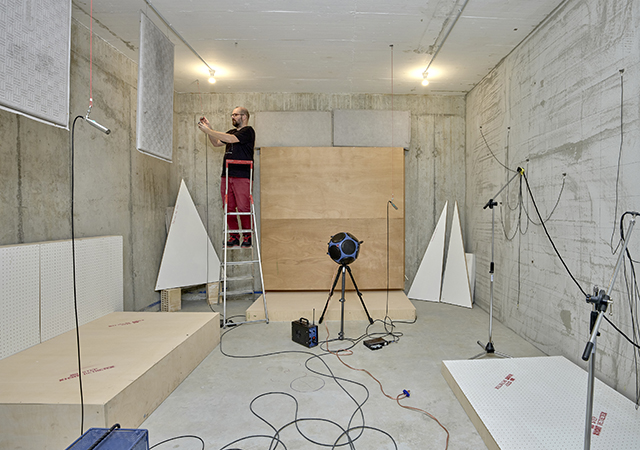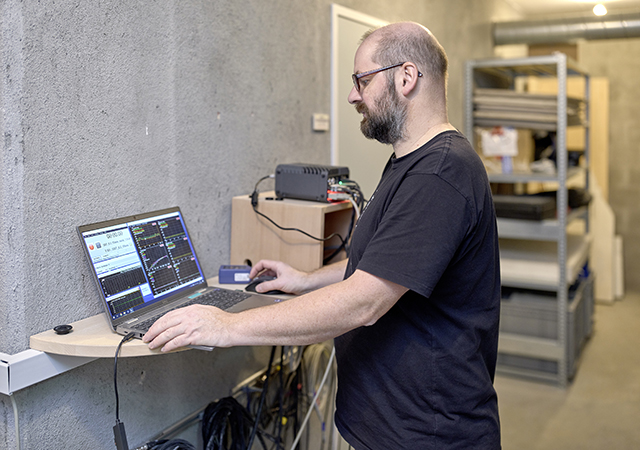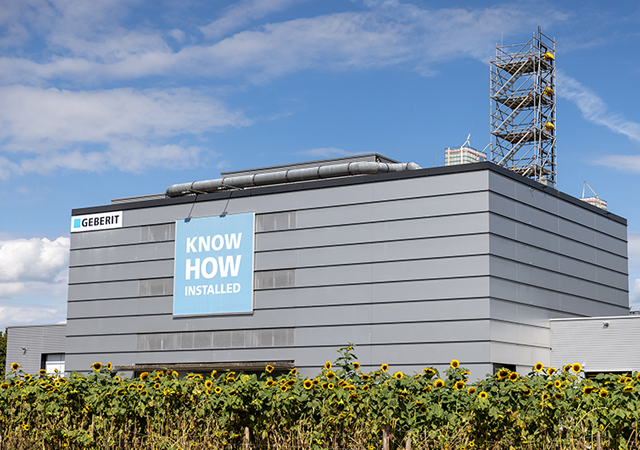
 Pasteur prepares the room for testing Silent-db20 SuperTube. The drainage pipe is located in the adjacent room.
Pasteur prepares the room for testing Silent-db20 SuperTube. The drainage pipe is located in the adjacent room.
Any product promising high sound insulation must first pass the acoustic tests in Geberit’s in-house laboratory. This was the case with the further development of the tried-and-tested SuperTube drainage solution for high-rise buildings.
The technology has already offered a significant advantage in the polyethylene (PE)variant for years; thanks to the optimised water flow, ventilation pipes are not necessary. This saves space in the shafts and creates more room height.
With Geberit Silent-db20 SuperTube, there is now another advantage: the system is quieter. Operating noise is noticeably reduced.
Over 1,000 measurements
Acoustic testing has a long tradition at Geberit, with the first measurements carried out over 70 years ago. The in-house Building Technology and Acoustics Laboratory in Rapperswil-Jona, Switzerland – where Geberit’s headquarters is located – has been used for this purpose for almost three decades, with a multi-storey structure on the roof providing a real high-rise environment for testing.
 |
|
Over 1,000 measurements of the Geberit Silent-db20 SuperTube System have resulted in an extensive data pool. |
“Sound can be measured and assessed in all relevant rooms,” explains acoustic engineer Samuel Pasteur. He has now taken well over 1,000 measurements for Geberit Silent-db20 SuperTube. Both structure-borne and airborne sound of the installation itself, as well as the acoustic performance in real construction scenarios, are measured.
“We install the piping systems in suspended ceilings or shafts just like on the construction site and test different panelling,” says Pasteur.
Data-based customer advice
The wealth of measurements for Silent-db20 SuperTube has resulted in a valuable data pool that impressively demonstrates Geberit’s acoustic expertise and offers sanitary engineers real added value.
“Based on our data, we can provide customers with expert advice on specific enquiries,” says Pasteur, whose team receives several dozen such enquiries every year from around the world.
So, what does the expert recommend when the stack of a high-rise building runs directly behind bedroom walls, where the standard in many countries stipulates that the noise level must not exceed 30 dB?
“Geberit Silent-db20 SuperTube, of course,” says Pasteur. Depending on the specific situation, he can provide additional tips – for example, how and where the pipes should be fixed or whether additional insulation is necessary.
 |
|
The Building Technology and Acoustics Laboratory with the test tower set up for Geberit Silent-db20 SuperTube. |
Noise reduction through design and material innovation
An optimal acoustic solution is always a combination of installation expertise and outstanding products. The new Geberit Silent-db20 fittings are characterised by their high inherent weight. The reinforced plastic significantly reduces the natural vibration, so that sound is audibly insulated. Special sound-insulating ribs at the impact zones and optimised flow behaviour also reduce the noise generated during the redirection from the vertical to the horizontal pipe and vice versa.
The globally operating Geberit Group is a European leader in sanitary products and celebrated its 150th anniversary in 2024. It operates with a strong local presence in most European countries, providing unique added value when it comes to sanitary technology and bathroom ceramics.
The group’s production network encompasses 26 production facilities, of which four are located overseas. Geberit has around 11,000 employees in more than 50 countries, and generated net sales of CHF3.1 billion ($3.6 billion) in 2024.

















.jpg)













 (1).jpg)













































